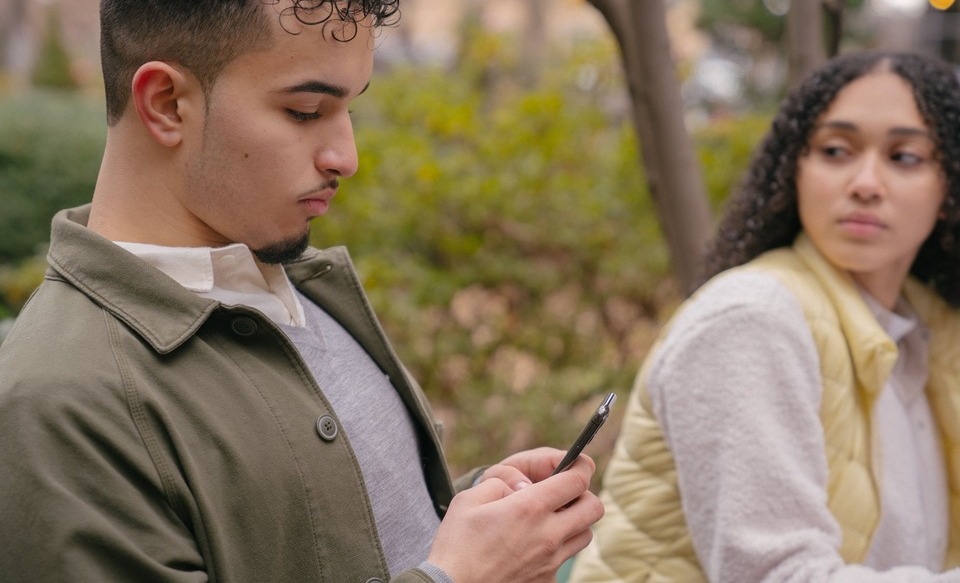Can you read this interview without glancing at your smartphone? During a recent conference on pedagogical innovation, Dr Raphaël Zaffran gave a workshop on the use of podcasts as experiential learning tools. On this occasion, Dr Zaffran raised a problem that concerns us all: the global decline in our attention and in our ability to concentrate. The development of social networks and new technologies has plunged us into a world of constant distraction. The Deputy Director of the University of Geneva’s Centre for Continuing and Distance Education offers his insights and solutions for the world of education and everyday life in the age of artificial intelligence.
You recently published an article arguing that “The ability to concentrate in depth is one of the key skills of the 21st century”. How do you explain the fact that concentration has become a rare virtue in our societies?
The world we live in is marked by an increase in distractions, mainly via digital tools. They are very useful in our daily lives, but the emergence of hyper-connectivity and the need for instantaneity have largely contributed to a decline in attention. Our brains are generally unable to do several things at once. Multitasking is a myth! What we think of as multitasking is actually “task-switching”: we switch rapidly from one task to another.
Is this really the case for all tasks?
You can certainly walk and chew gum at the same time. That’s multitasking: your ability to walk or chew gum is not affected by the other activity. But try writing a message on your smartphone and maintaining a conversation with your neighbour. In practical terms, it’s not impossible, but each of the tasks is affected by the fact that you’re halfway doing the other task. I think most people can relate to the experience of being deep in an interesting conversation with a friend, when suddenly a phone interrupts with a call or notification that completely derails the flow of the discussion.
The problem is we live in a world that encourages multitasking. People who practice it are generally perceived (and perceive themselves) as highly productive. Numerous studies have examined the consequences of this practice, and the reality is that constantly switching from one task to another takes a heavy toll on our mental energy. Some studies have also shown that the cost of task switching is generally unavoidable: people almost always take longer to complete a task, and make more mistakes, when they switch from one task to another than when they only deal with a single task.
These days, you can’t even watch a movie without being on your phone at the same time…
Indeed! It’s rarer at the cinema, because there’s a dimension of social control: we’re in a dark room where we know that the light from the phone will disturb people around us. But on your couch, it’s a different thing altogether… The quality of the experience of watching a film changes drastically if you pause constantly or look at your phone intermittently. The feeling of pleasure after watching a film with full concentration is completely different. Without the external social norms and expectations that guide our behaviour in public spaces like the cinema, it is all too easy for us to maintain a near-constant connection with our smartphone. We therefore become accustomed to reacting instinctively to even minor alerts and notifications, prioritizing our devices over the actual people and interactions in the physical world around us.
So do you associate the state of concentration with the notion of pleasure?
Certainly, and I can refer you to all the literature on “flow states” by psychologist Mihaly Csikszentmihalyi. He argued that the ability to concentrate leads to greater productivity, better learning, better skill acquisition and better problem-solving skills. But above all, he demonstrated that a feeling of happiness arises when we enter a state of “flow”, i.e. optimal concentration, a state we reach when we are completely immersed in an activity. If you can’t concentrate, you deprive yourself of moments of happiness.
“When was the last time you forgot or put aside your smartphone for at least two hours?”
Dr raphaël ZAFFRAn
You spoke of the cinema as a relatively preserved place, but isn’t that also true of the classroom?
Unfortunately, not. Many teachers have difficulty keeping their students’ attention, whether in undergraduate/graduate or continuing education programmes. And those who have been teaching since before the emergence of smartphones and social networks have really noticed the difference. There’s bound to be a gap between “traditional” teaching and the hyper-visual, stimulating content students can access on social networks, for example. Even a particularly charismatic instructor can hardly compete with these platforms in terms of stimulation. Traditional teaching requires concentration to assimilate the course content. No wonder students and teachers are frustrated: on the one hand, classes don’t seem attractive enough, and on the other, students find it increasingly difficult to stay focused. Experiential learning activities such as role-playing or simulations, which are widely used in continuing education with professional learners, can be very interesting for maintaining attention and fostering the acquisition of targeted skills.
What can be done about this general fragmentation of attention and concentration?
First, we need to talk about it. Research and books have been published on the subject, but they are little known because the results of this research are not widely disseminated among the general population. A great deal of scientific mediation and awareness-raising work needs to be done around these themes with the public because awareness is the starting point. Fascinating research conducted by King’s College London in 2022 included the question, “In your opinion, how many times a day do you look at your phone?” The average answer was 25 times a day, when in reality it was between 50 and 80 times a day. Despite this misperception, the people studied in these surveys were aware that their ability to concentrate had diminished. To explain this, they often cite notifications, the constant demands on our attention by numerous players.
“It’s not just a question of willpower, discipline, or desire to change. It’s a real societal problem.”
dr raphaËL ZAFFRAN
How do you get people and students to realize that they are “victims”?
I often ask, “When was the last time you forgot or put aside your smartphone for at least two hours?” Some will answer “when I’m playing sport or music”. That is, when they have no choice, or rather when the activity in question is absolutely incompatible with keeping their smartphone in their hand. But why not get into the habit of going out, from time to time, without your phone? The answer is that it can be useful in an emergency. But this type of occurrence is actually very rare. The compromise may be to take your phone with you, but leave it switched off in your bag. But it will require considerable discipline to resist the temptation to turn it on “just to check something”. Take a walk, go out without your phone. It’s by recreating these brief moments of disconnection that we realize how much peace we can gain from it.
What’s more, have you noticed that today we’re hardly ever bored? Before the emergence of smartphones, we had plenty of moments of boredom: waiting for the bus or our turn at the doctor’s, watching the people around us. These “moments between moments” allowed the brain to rest, consolidate learning and dream. These moments have all but disappeared. Every second or minute of lost time or boredom is filled by the smartphone. And when can our brains finally take a breather? When we decide to go to bed, at 11 p.m. or midnight… It’s hardly surprising that we’ve lost an hour’s sleep on average in 20 years, or that the number of people with sleep disorders has risen considerably.
Is it simply a question of willpower?
No, it’s a systemic problem, which requires systemic responses. It’s not just a question of willpower, discipline, or desire to change. It’s a real societal problem. We are faced with a permanent overload of stimuli, information and demands. It’s particularly complicated for the current generation of students, say the 16-25 age group, because for this generation there also seems to be a greater dimension of social status and peer pressure associated with constant connection. We can criticize them and say, “stop looking at your phone, get off your phone, concentrate…”, but a whole life, a whole society exists alongside the “in real life” society. If you’re not permanently connected to your phone, the social costs can be significant.
Even if you have the willpower, it’s very difficult to find ways of maintaining your attention. The more we become part of this system of hyper-connectivity, instantaneity and response to every stimulus, the fewer opportunities we get to practice our ability to concentrate in depth, and the more it tends to diminish. It’s perfectly possible to have a day or even a week during which we find it hard to concentrate – it’s always happened, even before digital technologies. But when this is our default position every minute of every day of the year for years on end, simply concentrating deeply on a task becomes a real achievement.
Read also: Neil Maiden: “In business, creativity is seen as a nice tool, not a must-have”
Who benefits from our weakening capacity for prolonged concentration?
No one. I’m currently working on a series of articles analysing the effects of the fragmentation of our attention and our increased difficulty to concentrate on both our educational and our social contracts because I consider this to be an important societal issue that we don’t talk about enough. In addition, Johann Hari’s excellent book Stolen Focus: Why You Can’t Pay Attention-and How to Think Deeply Again takes an in-depth look at the business model of social networks and apps, which have really monetized our attention, hence the idea that we live in an “attention economy”. The financial success of these companies depends on the time we spend connected to their applications. They compete for our attention, and their algorithms are designed to keep us connected. From a commercial point of view, the fragmentation of attention benefits these platforms. One sentence in Johann Hari’s book made a strong impression on me, it said essentially (and I’m paraphrasing here): “You can be the most disciplined person in the world, but you’re still alone against a thousand engineers behind these applications, whose mission is to monetize your attention”. We are all victims of this process.
“The ability to concentrate on a task is common to most value-generating activities, whether economic and social, artistic, or simply human.”
DR Raphaël ZAFFRAN
If the lack of concentration is due, in part, to the multiplication of technological tools, can the remedy for this lack of concentration be technological, particularly in education?
It all depends on how the technology is used. Obviously, I’m not anti-technology. When technology is used as part of a learning design, it can be an invaluable support. It helped us a lot during the Covid pandemic and containment. If Covid had appeared 20 years ago, it would have been much harder to maintain teaching continuity, imperfect as it may have been.
It’s interesting to note that many apps have also appeared to… help with concentration. Some of them, for example, allow you to block all applications other than the one you’re working on for a given time, thus limiting distractions. What’s more, most smartphones now give you data on your screen time and how it’s divided between your various applications. So the answer may be partly technological, yes. But in my opinion, the answer lies mainly in raising awareness, and possibly in training.
How do you quickly regain the attention of a class that is no longer paying attention?
Everyone gets up and gets moving or does some yoga or stretching! A change of pace and a reappropriation of space change everything. I’ve also experimented several times with the “walk and talk” approach, that is, discussions in small groups while walking. This can work very well, depending on the pedagogical objectives.
But even more simply, after a 20-minute PowerPoint presentation, for example, move on to a moment of discussion, sound out the students on what they have retained, show a short excerpt from a video illustrating your point, organize discussions in small groups, vary the activities and teaching materials.
Basically, why is it so important to concentrate?
When you think about it, the ability to concentrate on a task is common to most value-generating activities, whether economic and social, artistic, or simply human. We can also think of political and societal implications. If we consider that our main role and responsibility as citizens is to vote and elect our representatives, and we are unable to concentrate sufficiently on studying their proposals, then we become more vulnerable to manipulation and false information.
From a purely professional perspective, recruiters will also end up testing our ability to concentrate. There will be candidates who can concentrate, and there will be others. What opportunities will the others have? The ability to concentrate can therefore be considered one of the super-skills of the 21st century.
Have a look to Raphaël Zaffran’s Lifelonglearning@UNIGE podcast







